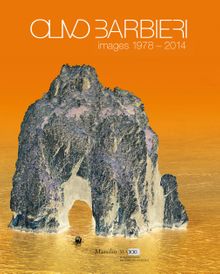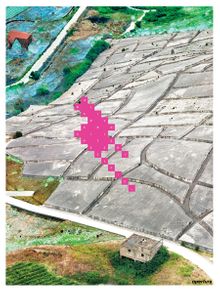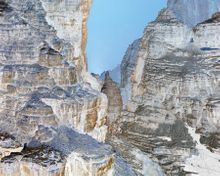PHOTOGRAPHY MONOGRAPHS
|
|
in stock $35.00 Free Shipping UPS GROUND IN THE CONTINENTAL U.S. |
 Olivo Barbieri
Olivo Barbieri
Images 1978-2014
Published by Marsilio Editori.
Text by Francesca Fabiani.
Where pictures stop being photography and become images. Olivo Barbieri has been working to represent space, especially urban space, since the 1970s. Various series of images document his research in this book. They include Viaggio in Italia, from the 1980s, a project directed by Luigi Ghirri; China (Far East), which looks at the big changes on the Asian continent; and Site Specific, a sequence of shots taken from a helicopter flying above the world's major cities, which made him internationally renowned. The book retraces Barbieri's themes and exploration, underscoring his constant attention to the idea of perception and his ability to envision and interpret reality. He casts quite some doubt over the conventional modes of representation through photography.
PUBLISHER
Marsilio Editori
BOOK FORMAT
Hardcover, 9.8 x 7.8 in. / 216 pgs / 150 color.
PUBLISHING STATUS
Pub Date 9/13/2016
Active
DISTRIBUTION
D.A.P. Exclusive
Catalog: Publisher Backlist
PRODUCT DETAILS
ISBN 9788831721929 TRADE
List Price: $38.50 CAD $55.00 GBP £34.50
AVAILABILITY
Out of stock
STATUS: Out of stock Temporarily out of stock pending additional inventory. |
 Olivo Barbieri: Ersatz Lights
Olivo Barbieri: Ersatz Lights
Case Study 1, East-West
Published by Hatje Cantz.
Text by Laura Gasparini, Francesco Zanot.
PUBLISHER
Hatje Cantz
BOOK FORMAT
Hardcover, 11.75 x 9.5 in. / 224 pgs / 194 color.
PUBLISHING STATUS
Pub Date 8/25/2015
Active
DISTRIBUTION
D.A.P. Exclusive
Catalog: FALL 2015 p. 102
PRODUCT DETAILS
ISBN 9783775739825 TRADE
List Price: $70.00 CAD $92.50
AVAILABILITY
Out of stock
STATUS: Out of stock Temporarily out of stock pending additional inventory. |
 Olivo Barbieri: Site Specific
Olivo Barbieri: Site Specific
Published by Aperture.
Introduction by Christopher Phillips.
PUBLISHER
Aperture
BOOK FORMAT
Hardcover, 9.75 x 13.5 in. / 184 pgs / 126 color.
PUBLISHING STATUS
Pub Date 9/30/2013
No longer our product
DISTRIBUTION
Contact Publisher
Catalog:
PRODUCT DETAILS
ISBN 9781597112291 TRADE
List Price: $75.00 CAD $90.00
AVAILABILITY
Not Available
 Olivo Barbieri: Dolomites Project 2010
Olivo Barbieri: Dolomites Project 2010
Published by Damiani.
PUBLISHER
Damiani
BOOK FORMAT
Hardcover, 15 x 11.5 in. / 32 pgs / 12 color.
PUBLISHING STATUS
Pub Date 7/31/2011
Out of print
DISTRIBUTION
D.A.P. Exclusive
Catalog: FALL 2011 p. 97
PRODUCT DETAILS
ISBN 9788862081726 TRADE
List Price: $40.00 CAD $50.00
AVAILABILITY
Not available
STATUS: Out of print | 00/00/00 For assistance locating a copy, please see our list of recommended out of print specialists |
 Viaggi in Italia, 1982-2009
Viaggi in Italia, 1982-2009
Published by Skira.
Edited by Sabrina Zannier.
Through 52 images from the full range of his work, an essay on Olivo Barbieri’s entire oeuvre reveals the multifaceted contours of an unusual Italy. Olivo Barbieri is an Italian photographer recognized for his innovative miniature still photographs created from actual landscapes by simulating shallow depth of field.
“I once asked Luigi Ghirri what he was looking for and he immediately replied, 'the truth'. I, on the other hand, have sought to represent the invisible; could truth and the invisible be the same thing?”
This question posed by Olivo Barbieri contains the entire sense of Reversing (of viewpoint, of the ordinary way of seeing and dealing with the real) and Revealing (of different stances one may take before the world) that translate truth into virtuality. Or into impossibility. With fifty-two images created from 1982 to 2009, Viaggi in Italia embraces nearly the artist's entire oeuvre, not so much in the spirit of a retrospective but with all the flavor of an essay.
This is a photography of places, of architectures, of urban and natural landscapes, of individuals and populations. Within it we see the modus vivendi, styles and tendencies, affiliations and de-localizations. This is not photography as reportage, but rather the type of creative voyage that conjoins visual beauty with a unique poetics, capable of following a connecting expressive thread through each image, whichever corner of the Earth it is from.
Olivo Barbieri is an Italian artist and photographer of urban environments. He is recognized for his innovative technique creating miniature still photography from actual landscapes by simulating shallow depth of field Barbieri has exhibited his work at the Venice Biennale (1993, 1995, 1997), among other international exhibitions, and in galleries and museums throughout Europe, North America, and China.Sabrina Zannier is a curator.
PUBLISHER
Skira
BOOK FORMAT
Paperback, 9.5 x 11 in. / 136 pgs / 55 color.
PUBLISHING STATUS
Pub Date 10/18/2011
Active
DISTRIBUTION
D.A.P. Exclusive
Catalog: Publisher Backlist
PRODUCT DETAILS
ISBN 9788857207315 TRADE
List Price: $35.00 CAD $45.00
AVAILABILITY
In stock
in stock $35.00 Free Shipping UPS GROUND IN THE CONTINENTAL U.S. |
 Olivo Barbieri: The Waterfall Project
Olivo Barbieri: The Waterfall Project
Published by Damiani.
PUBLISHER
Damiani
BOOK FORMAT
Hardback, 9.5 x 13.5 in. / 112 pgs / 40 color.
PUBLISHING STATUS
Pub Date 10/1/2008
Out of print
DISTRIBUTION
D.A.P. Exclusive
Catalog: FALL 2008 p. 72
PRODUCT DETAILS
ISBN 9788862080521 TRADE
List Price: $55.00 CAD $65.00
AVAILABILITY
Not available
STATUS: Out of print | 00/00/00 For assistance locating a copy, please see our list of recommended out of print specialists |

